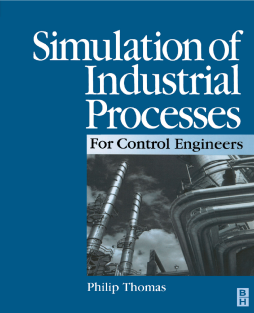
Additional Information
Book Details
Abstract
Computer simulation is the key to comprehending and controlling the full-scale industrial plant used in the chemical, oil, gas and electrical power industries. Simulation of Industrial Processes for Control Engineers shows how to use the laws of physics and chemistry to produce the equations to simulate dynamically all the most important unit operations found in process and power plant.
The book explains how to model chemical reactors, nuclear reactors, distillation columns, boilers, deaerators, refrigeration vessels, storage vessels for liquids and gases, liquid and gas flow through pipes and pipe networks, liquid and gas flow through installed control valves, control valve dynamics (including nonlinear effects such as static friction), oil and gas pipelines, heat exchangers, steam and gas turbines, compressors and pumps, as well as process controllers (including three methods of integral desaturation). The phenomenon of markedly different time responses ("stiffness") is considered and various ways are presented to get around the potential problem of slow execution time. The book demonstrates how linearization may be used to give a diverse check on the correctness of the as-programmed model and explains how formal techniques of model validation may be used to produce a quantitative check on the simulation model's overall validity.
The material is based on many years' experience of modelling and simulation in the chemical and power industries, supplemented in recent years by university teaching at the undergraduate and postgraduate level. Several important new results are presented. The depth is sufficient to allow real industrial problems to be solved, thus making the book attractive to engineers working in industry. But the book's step-by-step approach makes the text appropriate also for post-graduate students of control engineering and for undergraduate students in electrical, mechanical and chemical engineering who are studying process control in their second year or later.
"With his book, Professor Thomas has provided a major contribution to the modelling of major unit processes which are found in the chemical, oil-and -gas and power generation industries....the book represents a major achievement and can be strongly recommended."
IMechE - Proc. Inst. Mech. Engrs. October 2001
'..highly recommended to anyone involved in mathematical simulation for any purpose..'
Nuclear Energy, October 2000.
"Professor Thomas has produced a much-needed work in the field of modeling and simulation of industrial systems...It is most apparent that a practitioner with many years of experience has written this book....a most valuable addition to any technical library..It is a useful reference not just for control engineers but for mechanical and chemical engineers as well." - Intech (ISA Journal) , August 2000
"Engineers simulating industrial processes commonly found in the chemical, nuclear and oil industries will find this book essential to their work....this book will be of considerable importance to all engineers interested in the mathematical modelling and simulation of industrial processes. The book is clearly the most comprehensive and up-to-date treatise currently available on this important topic."
IEE Computing & Control Engineering Journal, April 2000.
"This is a significant book for those serious about learning how to produce good dynamic simulations of process plant...it shows how to use good science to derive models of the appropriate complexity to suit the particular problem....It is recommended both for those wishing to learn about the subject, and for the experienced who need to find out how to model a particular piece of equipment."
Measurement and Control, Nov. 1999
"Professor Thomas and his publishers are to be congratulated for producing such a useful resource text."
The Nuclear Engineer, Vol. 41, No. 1, 2000
"This book should be of great interest to those addressed in the title...It is difficult to think of a comparable source of explanation and information in this field."
Dr Alex Thompson, HMS Sultan
"it is rare to find a modern engineering textbook which combines theory and practice to such a useful effect. Professor Thomas is to be congratulated on providing such an outstanding work."
Dr Andrew Eadie, Glasgow Caledonian University.
